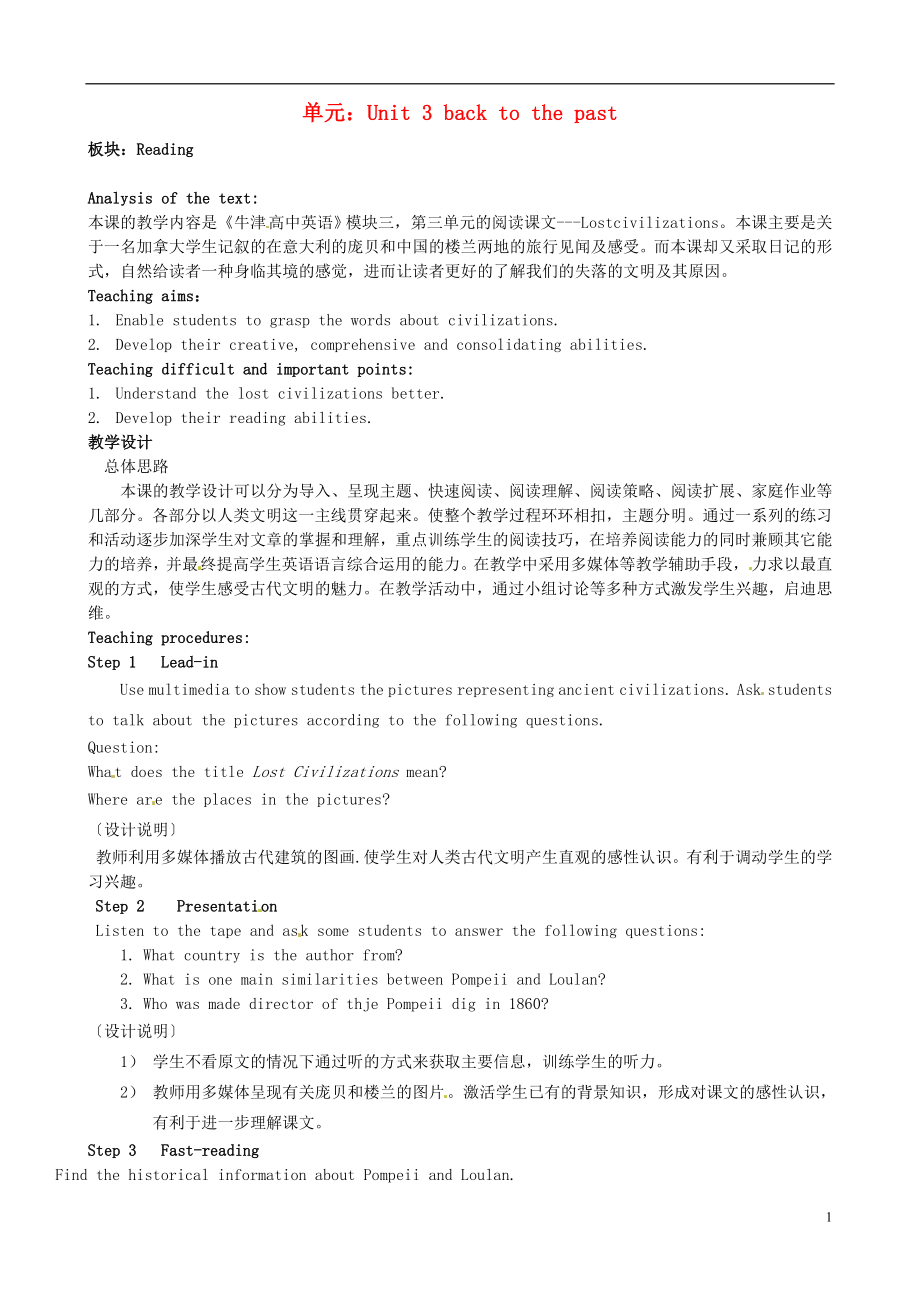《江蘇省徐州市睢寧縣寧海外國(guó)語(yǔ)學(xué)校高中英語(yǔ) Module3 Unit3 back to the past Reading導(dǎo)學(xué)案 譯林牛津版必修3》由會(huì)員分享����,可在線閱讀�,更多相關(guān)《江蘇省徐州市睢寧縣寧海外國(guó)語(yǔ)學(xué)校高中英語(yǔ) Module3 Unit3 back to the past Reading導(dǎo)學(xué)案 譯林牛津版必修3(4頁(yè)珍藏版)》請(qǐng)?jiān)谘b配圖網(wǎng)上搜索。
1��、
單元:Unit 3 back to the past
板塊:Reading
Analysis of the text:
本課的教學(xué)內(nèi)容是《牛津高中英語(yǔ)》模塊三����,第三單元的閱讀課文---Lost civilizations。本課主要是關(guān)于一名加拿大學(xué)生記敘的在意大利的龐貝和中國(guó)的樓蘭兩地的旅行見(jiàn)聞及感受��。而本課卻又采取日記的形式�,自然給讀者一種身臨其境的感覺(jué),進(jìn)而讓讀者更好的了解我們的失落的文明及其原因�����。
Teaching aims:
1. Enable students to grasp the words about civilizations.
2. Develop t
2、heir creative, comprehensive and consolidating abilities.
Teaching difficult and important points:
1. Understand the lost civilizations better.
2. Develop their reading abilities.
教學(xué)設(shè)計(jì)
總體思路
本課的教學(xué)設(shè)計(jì)可以分為導(dǎo)入�、呈現(xiàn)主題、快速閱讀���、閱讀理解���、閱讀策略、閱讀擴(kuò)展���、家庭作業(yè)等幾部分���。各部分以人類(lèi)文明這一主線貫穿起來(lái)。使整個(gè)教學(xué)過(guò)程環(huán)環(huán)相扣��,主題分明��。通過(guò)一系列的練習(xí)和活動(dòng)逐步加深學(xué)生對(duì)文章的掌
3��、握和理解���,重點(diǎn)訓(xùn)練學(xué)生的閱讀技巧����,在培養(yǎng)閱讀能力的同時(shí)兼顧其它能力的培養(yǎng),并最終提高學(xué)生英語(yǔ)語(yǔ)言綜合運(yùn)用的能力�����。在教學(xué)中采用多媒體等教學(xué)輔助手段���,力求以最直觀的方式�,使學(xué)生感受古代文明的魅力����。在教學(xué)活動(dòng)中�����,通過(guò)小組討論等多種方式激發(fā)學(xué)生興趣�����,啟迪思維���。
Teaching procedures:
Step 1 Lead-in
Use multimedia to show students the pictures representing ancient civilizations. Ask students to talk about the pictures according t
4����、o the following questions.
Question:
What does the title Lost Civilizations mean?
Where are the places in the pictures?
〔設(shè)計(jì)說(shuō)明〕
教師利用多媒體播放古代建筑的圖畫(huà). 使學(xué)生對(duì)人類(lèi)古代文明產(chǎn)生直觀的感性認(rèn)識(shí)。有利于調(diào)動(dòng)學(xué)生的學(xué)習(xí)興趣��。
Step 2 Presentation
Listen to the tape and ask some students to answer the following questions:
1. What coun
5��、try is the author from?
2. What is one main similarities between Pompeii and Loulan?
3. Who was made director of thje Pompeii dig in 1860?
〔設(shè)計(jì)說(shuō)明〕
1) 學(xué)生不看原文的情況下通過(guò)聽(tīng)的方式來(lái)獲取主要信息����,訓(xùn)練學(xué)生的聽(tīng)力。
2) 教師用多媒體呈現(xiàn)有關(guān)龐貝和樓蘭的圖片�����。激活學(xué)生已有的背景知識(shí)��,形成對(duì)課文的感性認(rèn)識(shí)���,有利于進(jìn)一步理解課文����。
Step 3 Fast-reading
Find the historical information
6����、about Pompeii and Loulan.
Pompeii
time
even
in the 8th century
?
in 89 BC
on 24th Aug. AD 79
in 1860
Loulan
2000 years ago
from AD 200
to AD 500
100 years ago
?
〔設(shè)計(jì)說(shuō)明〕
通過(guò)完成上述表格�����,幫助學(xué)生分別從時(shí)間上和內(nèi)容上分別把握每一則日記的大意����,從而從整體上把握文章的脈絡(luò)�。學(xué)生分組討論后多媒體顯示正確答案。
Step 4 Fur
7���、ther reading
A. Give the students some minutes to go through the text and give the answers to the following questions:
(1) What happened to Pompeii in August AD 79?
(2) How was the buried city discovered?
(3) What were the stepping stones along the road in Pompeii used for?
(4) Why was Loulan
8�、an important city about 2,000 years ago?
(5) How do many people think Loulan disappeared?
(6) According to the last sentence, how did the author feel about the loss of Loulan?
B. Do the sentences below express emotions (E) or actions (A)? Circleyour answers.
1 I feel lucky to have won a place
9�����、on this trip. E / A
2 This morning we went to a lecture about Pompeii. E / A
3 Unfortunately, all the people were buried alive, and so was the city ! E / A
4 How amazing ! E / A
5 People started
10���、to dig in the area for treasure. E / A
6 When I walked around the city, I saw streets just as they had been. E / A
7 I am so excited to be here! E / A
8 Sven found the remains of building buried under the sand. E /
11、A
〔設(shè)計(jì)說(shuō)明〕
學(xué)生分工合作�����,閱讀課本上Reading strategy的內(nèi)容并討論日記的特點(diǎn)���。在明確日記記述的時(shí)間���、地點(diǎn)的同時(shí)注意分清哪些部分是對(duì)事件的描述�����,哪些是對(duì)作者的個(gè)人情感的描述��。
C.Guess the meanings from the context if you do not know the answer:
1 represent _______ a (of a volcano) threw out lava and ash
2 take over _______ b acting or speaking fo
12��、r a group
3 erupt _______ c sadly, unlikely
4 unfortunately _______ d rich
5 house _______ e part of a building that remain after it has been badly damaged or destoryed
6 wealthy _______ f huge
7 ruins _______ g take control of
8
13���、 enormous _______ h provide space for
〔設(shè)計(jì)說(shuō)明〕
培養(yǎng)學(xué)生根據(jù)上下文猜測(cè)詞義的能力,提高學(xué)生用英語(yǔ)理解英語(yǔ)的能力���。加深和鞏固課文中的重要詞匯�����。
D Use the following words to complete this passage.
Pompeii civilizations treasure commercial sand
archaeologist volcano ruins erupted represent
I was so excited to b
14�、e picked to __________ Canada. I have been to _________ in Italy and am now in China visiting Loulan. Both places were important __________ cities about 2,000 years ago. They both disappeared and became lost __________. Pompeii was destroyed by a _________. It _________ and covered Pompeii with ash.
15�、
Loulan disappeared under the _________. No one is quite sure why. There are just a few _________ left. Some _________, such as coins and painted pots, was found, and recently some tombs. I am becoming very interested in ancient civilizations. Maybe I shall become an ___________ one day.
〔設(shè)計(jì)說(shuō)明
16、〕
本項(xiàng)練習(xí)是要求學(xué)生在掌握課文的基礎(chǔ)上完成的�����。是對(duì)課文內(nèi)容的擴(kuò)展。既是檢查學(xué)生對(duì)文章的理解程度�,又是檢查對(duì)詞匯掌握的熟練度。
Step 5 Creative discussion
Some people think that it is important to preserve old buildings and archaeological sites, while others think that the money and time should be used to help the poor. What's your opinion?
Pro-
know ab
17�、out the histroy learn about past culture
devolop tourism ...
anti-
help the poor is more important spend money on feeding, clothing, housing the poor...
the present matters more than the past
people are more important than old buildings that
18、have disappeared
(設(shè)計(jì)說(shuō)明)
以 Pompeii 和 Loulan作為失落的文明為背景��,培養(yǎng)學(xué)生對(duì)待保護(hù)文化古跡的正確態(tài)度及看法�。
step 6 Homework
Revise what has been learned in the class, try to retell the passage.
〔設(shè)計(jì)說(shuō)明〕
課外作業(yè)是課堂教學(xué)的深化。學(xué)生基于討論而進(jìn)行的寫(xiě)作不但使他們能進(jìn)一步理解文章的內(nèi)容���,還能幫助他們熟悉目標(biāo)語(yǔ)言�,鞏固所學(xué)知識(shí)���,提高寫(xiě)作能力�。
The design of the writing on the Bb:
Unit 3 Back to the past
Lost civilizations
Pompeii Loulan
4
 江蘇省徐州市睢寧縣寧海外國(guó)語(yǔ)學(xué)校高中英語(yǔ) Module3 Unit3 back to the past Reading導(dǎo)學(xué)案 譯林牛津版必修3
江蘇省徐州市睢寧縣寧海外國(guó)語(yǔ)學(xué)校高中英語(yǔ) Module3 Unit3 back to the past Reading導(dǎo)學(xué)案 譯林牛津版必修3

